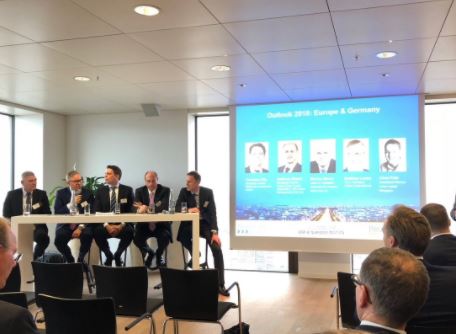The office sector in Germany offers the best opportunities for investors thanks to the prospect of significant rental growth, experts agreed at the PropertyEU Europe and Germany Outlook 2018.
'Offices will become even more attractive than they are now,’ said Matthias Leube, CEO of Colliers International. 'That is my favourite theme of 2018 because of high demand and low vacancy rates. If you as a landlord have flexibility, if your tenants are either moving out or re-negotiating their lease, you can get 20% more for the space.'
The Outlook event was held in Frankfurt on 28 November.
Go to the briefing presentation and video highlights
Record years
2017 will be remembered as a record-breaking year for office take-up in Germany, thanks to ongoing employment growth, and vacancy rates in all the main cities have decreased to the lowest levels since 2008. The same pattern is likely to be repeated in 2018.
'The German economy keeps growing and creating jobs, and this translates into occupier demand,’ said Christian Zilly, Managing Partner, Waterway Investments. ‘There is no doubt that offices are the most sought-after sector.'
A strong economy is creating optimism in the market. 'Sentiment is at the highest levels since the beginning of the century and there is no sign that the party is about to end,' said Axel Drwenski, head of research, Commerz Real. 'This is not a bubble. From our point of view, there is no risk.'
Capital
Berlin is set to be the fastest-growing city in the next five years, according to Drwenski, and the driving factor will be employment growth above the national average, at +2.4% compared to 1.4%, with most jobs being created in the tech sector. 'The vacancy rate in Berlin has gone from 12% to 3%, and in 2018 we expect prime rental growth to go up by 4%,' he said.
'In Frankfurt, rents are increasing but not skyrocketing, which seems to indicate that the banking sector is not willing to overpay,' he said. 'The vacancy rate has dropped from 20% to 10%, which suggests that things are going well.'
The Commerz Real forecast is that prime rents will rise by 2% in Frankfurt in 2018 and the following year. 'Despite all the hype over the Brexit effect and the announcements by major international banks that they are taking up office space in the city, ‘I would still invest in offices in Frankfurt because I believe they are still undervalued,' said Leube.
In Munich, the vacancy rate is 3%. 'It is so low,' said Drwenski, 'that companies like BMW are beginning to relocate out of town. Demand is such that we expect prime rents to increase dramatically in 2018, by 4%, with vacancy rates remaining low.'
Investors prefer to go for the big cities because 'there are more fishes in those ponds,' said Chris Fritz, investment director at Orion Capital Managers. 'Outside the top 7 there are not that many tenants to choose from. We are very bullish on the German office market from an occupier point of view, demand is very strong so we are happy to take on leasing risk.'


































